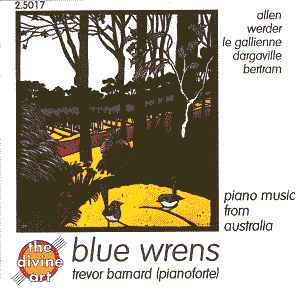Contemporary Australian music is little known in the
UK, and this CD gives us a chance to get the flavour by featuring a
selection of the piano music of five Australian composers.
Geoffrey Allen (b. 1927) is represented by Three
Piano Pieces Op. 23. These comprise The Parson’s Pleasure, D’Alliance
française and Blue Wrens at Amberley (these Australian
birds are featured on the lino-cut illustration on the cover and also
give the title to the CD). These are gentle melodic pieces reminiscent
of Delius, spiced with just the occasional touch of dissonance. The
Sonata No 4 is a recent work which is dedicated to Trevor Barnard. This
is a one movement work written in a concentrated manner.
Felix Werder (b. 1922) has written several operas,
symphonies and concertos and has been honoured with the Order of Australia.
The three movement Monograph is written in a very ‘modern’ style
and is at its best in the faster last movement. Dorian Le Gallienne
(1915-63) was a leading musical figure of his time. His Sonata is
an interesting and approachable work in three movements with the first
two full of energy followed by one that is serene and slow.
Night Song, by Tim Dargaville (b. 1962),
is from a play about Ned Kelly and represents his calm during the last
night in gaol before his execution. It is a moving and poignant piece.
Music by Michael Bertram (b. 1935) concludes
the CD. His Sonatina is a short three movement work which begins to
reveal its secrets only after repeated hearings. His Five Pieces for
piano have short descriptions – Remelia, a mythical kingdom;
Inegu, a slightly knowing ingenuousness; Kinetic, an endless
energy source; Violet, a formidable lady; and Iconoclast,
the breaker of idols. These are fascinating sound pictures of which
Kinetic is the most spectacular.
Trevor Barnard, the British-born Australian pianist
plays these often difficult pieces very well, achieving a wonderful
full sound. The recording is exemplary. The cover design and full notes
(many by the composers) are excellent.
The disc is an interesting one and indicates the wealth
of composing talent in the Antipodes.
Arthur Baker
See also review by Hubert
Culot


